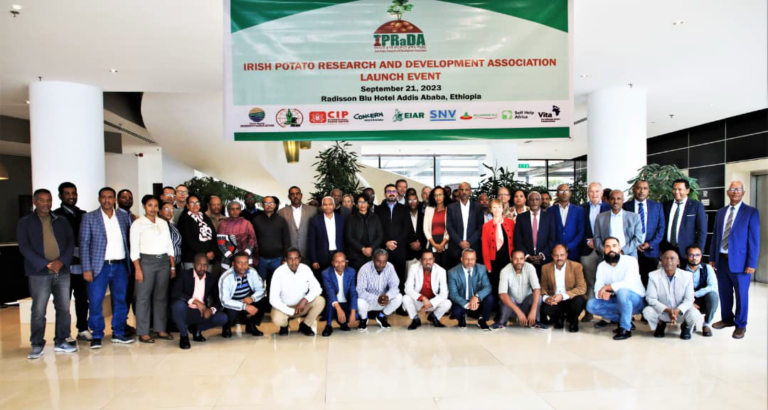Ethiopia is on the cusp of a transformative shift in potato farming that promises sustainable growth and development. The Irish Potato Research and Development Association, or IPRaDA, leads this charge. In this blog, we delve into the origins, objectives, and aspirations of IPRaDA, a coalition poised to uplift the lives of potato farmers in Ethiopia.
Genesis of IPRaDA
IPRaDA’s roots trace back to the inception of the National Irish Potato Coalition (IPC) in Ethiopia. IPC was a collaborative effort involving several prominent entities, including the Ethiopian Ministry of Agriculture (MoA), Ethiopian Institute of Agricultural Research (EIAR), Gamo Vegetable Cooperatives Union, International Potato Center (CIP), SOLAGROW, Action on Poverty, Vita, SNV, Self Help Africa, and the Irish embassy in Ethiopia. Initially a pre-formal group, IPC achieved commendable milestones, raising awareness about the paramount importance of potatoes in agriculture. IPC initiated tests for zonal potato committees to enhance coordination, organized national learning workshops, and facilitated the shift of seed multiplication from research centers to farmers. They also published crucial technical guidelines for Quality Declared Seed inspection, crafted a catalog of improved Ethiopian potato varieties, and mapped all stakeholders within the Ethiopian potato sector. They launched the informative website IPC Ethiopia to enhance their presence further.
Despite their initial successes, IPC encountered constraints regarding growth and funding capacity as a pre-formal group in Ethiopia. To overcome these challenges, the Irish Potato Coalition-Ethiopia underwent a significant transformation. On November 28, 2022, it officially registered as a local civil society organization under the name ‘Irish Potato Research and Development Association (IPRaDA)’. The establishment of IPRaDA was a testament to the collective efforts of government bodies, civil society organizations, private sector stakeholders, and international organizations deeply engaged in potato development, science, and business in Ethiopia. Founding members of IPRaDA included ARARI, CIP, Concern Worldwide, EIAR, MoA, Self Help Africa, SOLAGROW, SNV, and Vita, with EIAR generously providing office space for the association. IPRaDA’s approach is centered around establishing a robust knowledge platform that acts as a catalyst for change, enabling the realization of its multifaceted objectives, which encompass:
- Developing viable seed potato systems for smallholder farmers.
- Elevating potato productivity to enhance nutrition and income concurrently.
- Forging a robust, equitable value chain that generates wealth for farmers and enterprises.
- Elevating the role of potatoes within sustainable food systems.
Inaugural Workshop
Following the establishment of the coalition, VITA, SNV, Self Help Africa, Concern CIP and the CGIAR initiative in National Policies and Strategies sponsored its inaugural workshop on 21st of September 2023 at the Raddison Blu Hotel, Ethiopia. The workshop aimed to bring together key stakeholders to discuss and address the challenges facing the potato sector, such as climate change, market dynamics, and post-harvest management, while also exploring opportunities for growth and collaboration.

Reflecting on the Potato Value in Ethiopia
The workshop included panel discussions featuring esteemed experts. Dr. Atsede from the Ethiopian Institute of Agricultural Research (EIAR) emphasized the growing significance of potato farming in Ethiopia. Mr. Jan Van der Haar, Manager of SOLAGROW, highlighted the importance of crop rotation in achieving sustainable potato farming in Ethiopia. Gerrit Holtland discussed the coordination and alignment along the potato value chain. At the same time, Mr. Derick Roulston emphasized the importance of forging strategic alliances.
Call to action
The workshop provided an opportunity to review the current state and potential avenues for improvement in the Ethiopian potato sector. The call to action is clear: stakeholders must join and engage in IPRaDA as active members to reinforce the organization and drive positive change in the potato sector. This entails stitching the value chain, working collectively to discover innovative solutions, and establishing necessary by-laws. With concerted efforts, Ethiopia’s potato industry’s future holds great promise for sustainable growth and development.
